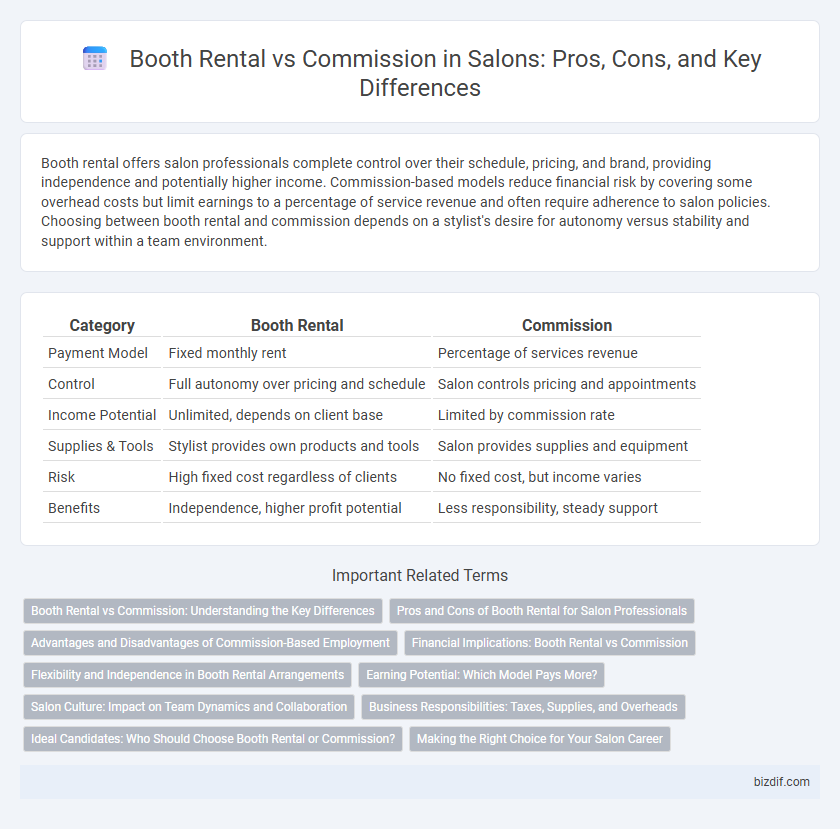Booth rental offers salon professionals complete control over their schedule, pricing, and brand, providing independence and potentially higher income. Commission-based models reduce financial risk by covering some overhead costs but limit earnings to a percentage of service revenue and often require adherence to salon policies. Choosing between booth rental and commission depends on a stylist's desire for autonomy versus stability and support within a team environment.
Table of Comparison
| Category | Booth Rental | Commission |
|---|---|---|
| Payment Model | Fixed monthly rent | Percentage of services revenue |
| Control | Full autonomy over pricing and schedule | Salon controls pricing and appointments |
| Income Potential | Unlimited, depends on client base | Limited by commission rate |
| Supplies & Tools | Stylist provides own products and tools | Salon provides supplies and equipment |
| Risk | High fixed cost regardless of clients | No fixed cost, but income varies |
| Benefits | Independence, higher profit potential | Less responsibility, steady support |
Booth Rental vs Commission: Understanding the Key Differences
Booth rental involves hairstylists or beauty professionals leasing their own space within a salon and managing their own clients, prices, and schedules, while commission-based work means stylists receive a percentage of the services they perform, with the salon controlling pricing and client assignments. Booth rental offers greater independence and potential for higher earnings but requires managing expenses such as supplies and taxes. Commission structures provide less financial risk yet often result in lower take-home income due to salon fees and limited control over business aspects.
Pros and Cons of Booth Rental for Salon Professionals
Booth rental offers salon professionals independence by allowing them to manage their own schedules, pricing, and client base, fostering entrepreneurial growth. The downside includes bearing all business expenses such as product costs, taxes, and insurance, which can impact financial stability without a steady client flow. This model suits self-motivated stylists who prioritize autonomy over the consistent support and marketing provided in commission-based setups.
Advantages and Disadvantages of Commission-Based Employment
Commission-based employment in salons offers stylists a steady income with less financial risk compared to booth rental, as the salon manages expenses like supplies and marketing. Stylists can benefit from immediate access to an established client base and professional support, while experiencing potential income fluctuations based on performance and salon policies. However, commission rates often limit overall earnings and reduce autonomy, making it less appealing for highly independent or entrepreneurial professionals.
Financial Implications: Booth Rental vs Commission
Booth rental offers salon professionals a fixed monthly cost, providing greater control over their earnings but requiring upfront financial responsibility for supplies and marketing. Commission-based models allow stylists to pay a percentage of their revenue to the salon, which reduces initial expenses but limits income potential as earnings are shared. Evaluating cash flow stability and profit margins is crucial for choosing between the predictable expense of booth rental and the variable costs associated with commission.
Flexibility and Independence in Booth Rental Arrangements
Booth rental offers salon professionals greater flexibility and independence by allowing them to set their own schedules and choose their preferred services without adhering to salon-imposed commissions. This arrangement empowers stylists to control their revenue streams entirely, fostering entrepreneurial growth and personalized client management. Unlike commission-based roles, booth renters can customize their work environment and pricing strategies to align with their business goals and lifestyle preferences.
Earning Potential: Which Model Pays More?
Booth rental offers hairstylists a fixed rental fee, allowing them to keep 100% of their service earnings, which can lead to higher profit margins for high-demand professionals. Commission models typically provide a percentage of the stylist's service revenue to the salon, often ranging between 40% to 60%, reducing the stylist's take-home pay but including benefits like marketing and client acquisition. Stylists with an established clientele may earn more through booth rental, while those relying on salon resources might find commission models more financially viable.
Salon Culture: Impact on Team Dynamics and Collaboration
Booth rental fosters a sense of independence among stylists, encouraging entrepreneurship but potentially reducing team cohesion and shared goals within the salon culture. Commission-based models promote collaboration and collective success, as stylists often depend on salon management and peers for client referrals and support. Understanding how compensation structures influence motivation and interaction can help salons create a balanced environment that enhances both individual performance and team dynamics.
Business Responsibilities: Taxes, Supplies, and Overheads
Booth rental requires salon professionals to manage their own taxes, supplies, and overhead costs, offering greater control but increased financial responsibility. Commission-based stylists have taxes partially handled through salon payroll, with supplies and overhead typically covered by the salon, reducing individual expenses. Understanding these differences helps salon professionals choose the best business model aligning with their financial management preferences and risk tolerance.
Ideal Candidates: Who Should Choose Booth Rental or Commission?
Booth rental is ideal for experienced stylists seeking autonomy, fixed income, and control over their schedules, making it perfect for those with established clienteles. Commission-based compensation suits newer stylists or those preferring support from salon management, offering a steady pathway to build clientele with less financial risk. Understanding the trade-offs helps stylists align their career goals with the financial and operational model that best fits their work style and growth aspirations.
Making the Right Choice for Your Salon Career
Choosing between booth rental and commission-based salon work significantly impacts your income and professional growth. Booth rental offers autonomy, allowing stylists to set their own rates and retain full earnings but requires managing expenses like rent and supplies. Commission models provide a steady income and client base support, with the salon handling marketing and product expenses, ideal for those seeking stability and fewer administrative tasks.
Booth Rental vs Commission Infographic

 bizdif.com
bizdif.com